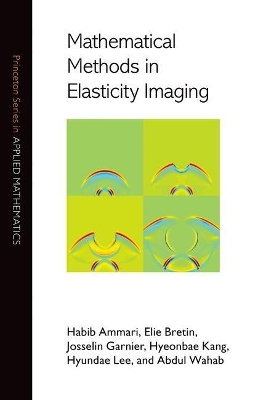
Mathematical Methods in Elasticity Imaging
Princeton University Press (Verlag)
978-0-691-16531-8 (ISBN)
- Lieferbar (Termin unbekannt)
- Versandkostenfrei innerhalb Deutschlands
- Auch auf Rechnung
- Verfügbarkeit in der Filiale vor Ort prüfen
- Artikel merken
Habib Ammari is director of research at the French National Center for Scientific Research and professor of mathematics at the Ecole Normale Superieure. Elie Bretin is a postdoctoral researcher in mathematics at the Ecole Polytechnique. Josselin Garnier is professor of mathematics at Universite Paris VII. Hyeonbae Kang is the Jungseok Chair Professor of Mathematics at Inha University in South Korea. Hyundae Lee is assistant professor of mathematics at Inha University. Abdul Wahab is a postdoctoral researcher in mathematics at Universite Paris VII.
Introduction 1 1 Layer Potential Techniques 4 1.1 Sobolev Spaces 4 1.2 Elasticity Equations 6 1.3 Radiation Condition 10 1.4 Integral Representation of Solutions to the Lame System 11 1.5 Helmholtz-Kirchhoff Identities 21 1.6 Eigenvalue Characterizations and Neumann and Dirichlet Functions 27 1.7 A Regularity Result 32 2 Elasticity Equations with High Contrast Parameters 33 2.1 Problem Setting 34 2.2 Incompressible Limit 34 2.3 Limiting Cases of Holes and Hard Inclusions 36 2.4 Energy Estimates 38 2.5 Convergence of Potentials and Solutions 42 2.6 Boundary Value Problems 45 3 Small-Volume Expansions of the Displacement Fields 48 3.1 Elastic Moment Tensor 48 3.2 Small-Volume Expansions 55 4 Boundary Perturbations due to the Presence of Small Cracks 66 4.1 A Representation Formula 66 4.2 Derivation of an Explicit Integral Equation 69 4.3 Asymptotic Expansion 71 4.4 Topological Derivative of the Potential Energy 75 4.5 Derivation of the Representation Formula 76 4.6 Time-Harmonic Regime 79 5 Backpropagation and Multiple Signal Classification Imaging of Small Inclusions 80 5.1 A Newton-Type Search Method 80 5.2 A MUSIC-Type Method in the Static Regime 82 5.3 A MUSIC-Type Method in the Time-Harmonic Regime 82 5.4 Reverse-TimeMigration and Kirchhoff Imaging in the Time-Harmonic Regime 84 5.5 Numerical Illustrations 86 6 Topological Derivative Based Imaging of Small Inclusions in the Time-Harmonic Regime 91 6.1 Topological Derivative Based Imaging 91 6.2 Modified Imaging Framework 102 7 Stability of Topological Derivative Based Imaging Functionals 112 7.1 Statistical Stability with Measurement Noise 112 7.2 Statistical Stability with Medium Noise 118 8 Time-Reversal Imaging of Extended Source Terms 125 8.1 Analysis of the Time-Reversal Imaging Functionals 127 8.2 Time-Reversal Algorithm for Viscoelastic Media 129 8.3 Numerical Illustrations 137 9 Optimal Control Imaging of Extended Inclusions 148 9.1 Imaging of Shape Perturbations 149 9.2 Imaging of an Extended Inclusion 152 10 Imaging from Internal Data 160 10.1 Inclusion Model Problem 160 10.2 Binary Level Set Algorithm 162 10.3 Imaging Shear Modulus Distributions 164 10.4 Numerical Illustrations 165 11 Vibration Testing 168 11.1 Small-Volume Expansions of the Perturbations in the Eigenvalues 169 11.2 Eigenvalue Perturbations due to Shape Deformations 181 11.3 Splitting of Multiple Eigenvalues 192 11.4 Reconstruction of Inclusions 193 11.5 Numerical Illustrations 195 A Introduction to Random Processes 201 A.1 Random Variables 201 A.2 Random Vectors 202 A.3 Gaussian Random Vectors 203 A.4 Conditioning 204 A.5 Random Processes 205 A.6 Gaussian Processes 206 A.7 Stationary Gaussian Random Processes 208 A.8 Multi-valued Gaussian Processes 208 B Asymptotics of the Attenuation Operator 210 B.1 Stationary Phase Theorem 210 B.2 Derivation of the Asymptotics 211 C The Generalized Argument Principle and Rouche's Theorem 213 C.1 Notation and Definitions 213 C.2 Generalized Argument Principle 214 C.3 Generalization of Rouche's Theorem 214 References 217 Index 229
| Reihe/Serie | Princeton Series in Applied Mathematics |
|---|---|
| Zusatzinfo | 22 halftones. 9 line illus. 1 table. |
| Verlagsort | New Jersey |
| Sprache | englisch |
| Maße | 178 x 254 mm |
| Gewicht | 539 g |
| Themenwelt | Mathematik / Informatik ► Mathematik ► Angewandte Mathematik |
| Mathematik / Informatik ► Mathematik ► Wahrscheinlichkeit / Kombinatorik | |
| Naturwissenschaften ► Physik / Astronomie | |
| Technik ► Maschinenbau | |
| ISBN-10 | 0-691-16531-9 / 0691165319 |
| ISBN-13 | 978-0-691-16531-8 / 9780691165318 |
| Zustand | Neuware |
| Informationen gemäß Produktsicherheitsverordnung (GPSR) | |
| Haben Sie eine Frage zum Produkt? |
aus dem Bereich


